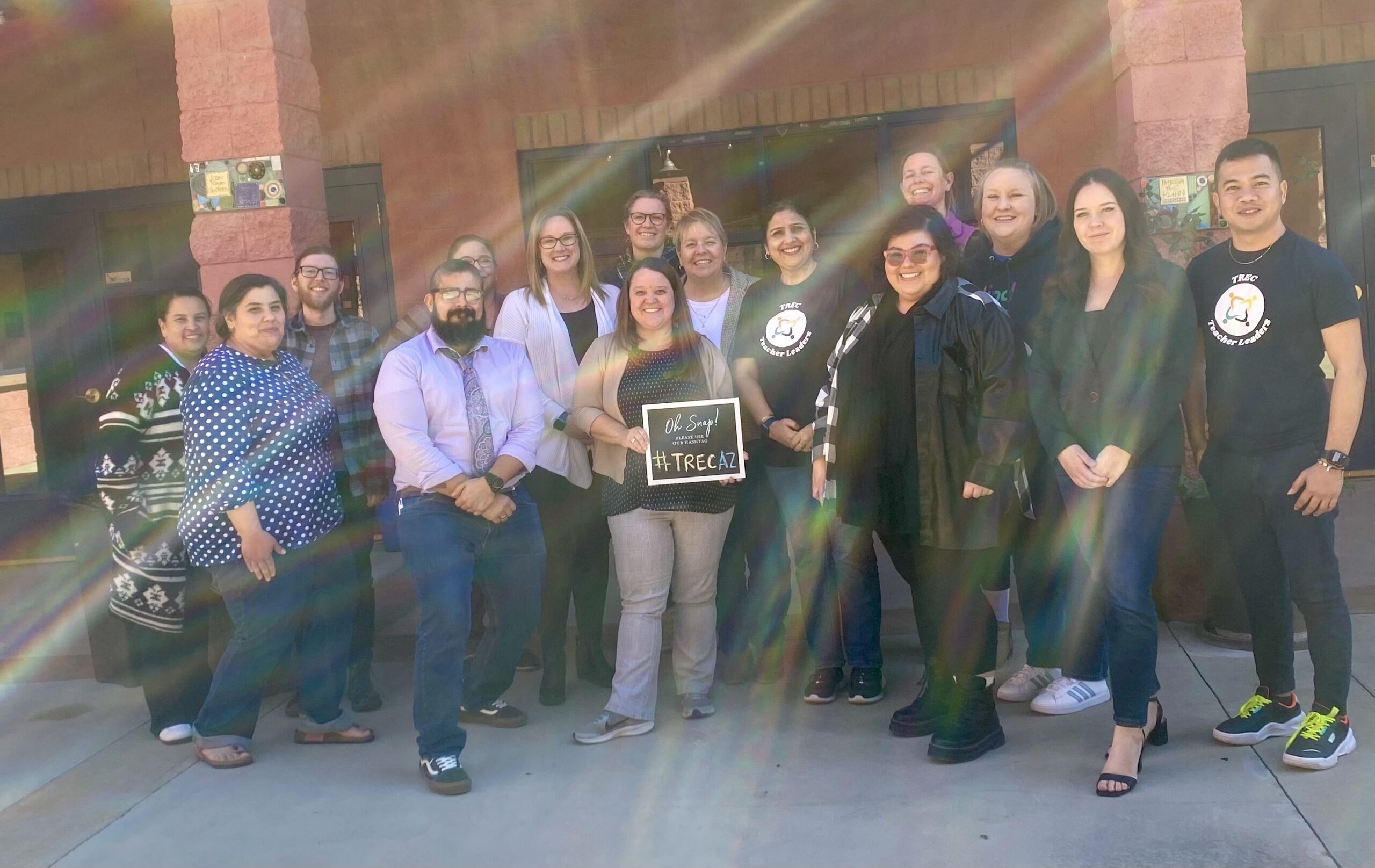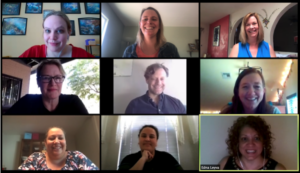A Thank You to Tucson Region Educators from the Founding TREC Director
 March 7, 2023 | Post by : Jen
March 7, 2023 | Post by : Jen
Thank you Tucson Region Educators!
By: Jen Kinser-Traut, Ph.D.
“Within TREC I found a breath that blew life into who I was as a teacher. It gave us a new purpose, a group that was going to help bring that change around, a place to belong to as a teacher and not as part of a district.” –Sarah, TREC Founding Teacher Leader
As I wrap up my last month as the TREC Director, I can’t help but look back over the last almost 5 years and be amazed! Mainly, the source of my amazement comes from the tremendous support, engagement, and commitment of the region’s educators in developing TREC. Teachers are experts is one of TREC’s core values and it holds true! The Tucson region’s educators are professionals—as professionals, they are interested in both continuing their own professional learning but also supporting/mentoring novice educators as they join the education profession. It is my strong belief that TREC has been successful thus far because we’ve put teachers in the driver seat—both in developing the overall endeavor of a regional educator collaborative, but also in the specific development of the website and teacher leader program. Thank you teachers for seeking to be the solution to the region’s low teacher retention by creating a collaborative community! In this post, I highlight several of TRECs’ key successes and how teachers were instrumental in ensuring these successes.
Development of TREC: It was decided early on that the design of TREC needed to be teacher-led, thus ensuring teacher voice was at the forefront of the development and design. We created an educator survey that was completed by 1396 educators (within two weeks!)—the number of responses in such a short time was the first clear message that teachers were really interested in the effort. We also held a happy hour in partnership with Tucson Values Teachers (TVT) that focused on celebrating teachers and was the foundation for a professional learning exploration/discussion around what teachers were looking for with regards to Professional Development. The results from these data collection efforts set the foundation for the two-day design charette retreat held in March of 2019. Over 50 educators (including 20 teachers, superintendents, representatives from the Pima County Superintendent’s Office, seven school districts, and professional development providers) gathered at Amphi’s Professional Learning Center and engaged in a region-wide conversation about ways to meet teachers’ professional development needs, that were not currently being met. The traditional “sit and get” style was no longer working—we needed teacher powered, job-embedded ways to connect and learn from each other. Three key priorities were identified by the group of educators: 1. Website Hub; 2. Teacher Leader Opportunities; and 3. Communities of Practices / Network Improvement Communities. Karyn, a founding TREC Teacher Leader, shared a sentiment many expressed, “When I was invited to the design charette, I had no idea what this would become!” This uncertainty of the process was common, but soon the energy, ideas, and solutions in the room outweighed that uncertainty. Karyn continued, “I was in a room with tremendous educators crafting ideas that would begin to take shape and form what became Tucson Regional Educator Collaborative.”**Note: If you’re interested in learning more about the development of the collaborative, please read Dr. Ron Marx and my article, “Designing a Regional Teacher Professional Development Enterprise” in Frontiers Education about the development of TREC, including the initial two-day design charette retreat.
As TREC evolved, it was affirming to hear from the region’s districts, professional development providers, and many, many educators how much TREC was needed. It was the start of collaboration among educators who had been working in silos for too long. We could now purposefully leverage the region’s resources to positively impact teachers and in turn student learning.
Development of Website: In September 2019, a diverse group of 48 educators (teachers, PD Providers, District Representatives, and others) came together at the Community Foundation Campus for a full day of design thinking protocols to develop an initial wireframe of the TREC Website. This was my first full-day retreat facilitation, and my first foray into design thinking protocols. Given that our goal was rather lofty (together design a regional website hub that focuses on the user) I was uncertain the day would be a success. Yet, with the help of UArizona’s College of Education Tech Team, we had a draft website ready to go by the end of the day based entirely on the collective design of the group. There was a round of applause when we first presented the website for the group to see.
Following the website design retreat, the momentum continued with the TREC Website Working Group (a five-person team, including teachers) and a second retreat in the spring. The spring retreat brought 49 educators together and our focus was to determine content standards and goals of the website (e.g., connecting educators to meaningful PD). There was palpable excitement and energy at each of these design retreats and meetings to further develop the website. What I find particularly valuable about how the website was developed is that first, a need was identified by the region’s educators—a one stop shop website that provides educators with professional development resources—and second that the region’s educators were working together to design the solution for this need. Specifically, teachers were able to share their specific needs, preferences, and interests around a resource website. Furthermore, as we hired a website designer and the website officially launched in the fall of 2020, we engaged in several rounds of UX (User Experience) interviews with the region’s teachers to learn what was working and what wasn’t. While there are still areas of improvement, the TREC Website is a model for other regions to ensure their region’s educators have access to meaningful professional learning resources that in turn will support teacher retention and student learning. This success is thanks to the dedication of the region’s educators! As of March 1st, we have had over 27,500 educators visit the TREC website to view over 1,500 resources (including on-demand)! If you haven’t yet, please explore the website and share it with others: TRECarizona.org. While visiting the website, make sure to create a profile so you can save your favorite resources!
Development of Teacher Leaders: Following the two-day design charrette (and drawing on the educator survey data), there was a clear need and interest in teacher leadership opportunities for classroom teachers. We launched the first cohort of Teacher Leaders in August 2019, with eight teachers from seven districts and one charter school. It was an amazing group of educators who helped develop the Teacher Leader Program, identifying educator emotional resilience as a key need (note, this was prior to the pandemic) and chose to engage in a book study reading the book, Onward, by Elena Aguilar. Edna, one of the founding teacher leaders shared this about the experience, “This was my first introduction to what actual book studies look like in the professional world. The camaraderie that I gained from this group of educators was instant and I was surprised to find out how much we had in common, regardless of the fact that we all came from different backgrounds and schools.” The following school year (2020-2021), these eight teacher leaders led their own Communities of Practice focused on the book Onward, with educators from across the region and provided essential support to each other during the challenging school year that it was. Again and again, educators that engaged in TREC efforts/activities highlighted the value of breaking down silos and learning together across districts and schools.
Since the original cohort of teacher leaders, we’ve added three additional teacher leader cohorts, and together developed key teacher leader competencies: Professionalism, Communication, Professional Learning, Professional Development, and Advocacy for Teaching and Learning. None of us quite knew what the TREC Teacher Leaders would become, but we all jumped in fully. Here’s how Lauren, a Founding Teacher Leader, explains it, “I wasn’t sure what I was getting into at first with TREC, but I knew I was interested in leadership, learning, and elevating the profession, and this was an opportunity to do something groundbreaking in my community. Becoming a TREC teacher leader was one the best decisions I ever made. My perspective of teaching, learning, and the community has completely changed and empowered me to pursue things outside my comfort zone. I have gained leadership skills, I have met people that I otherwise would not have met, and I have made some life-long friends in the process.” The TREC Teacher Leader program has been transformative for many of the teacher leaders.
From my own experience as a teacher, as the founding director, and the experience co-developing the Teacher Leader Program with the TREC Teacher Leaders (cohorts 1-4!) the importance of developing a professional community bridging districts, subjects, and ages/grades is essential in supporting one’s own growth as an educator. To further support the region’s educators the TREC Teacher Leaders each run a Community of Practice (CoP) their second year in the program. These communities of practice focus on educator emotional resilience, equitable grading, mentoring, makerspaces, and early childhood learning. Founding Techer Leader Joni explains, “As we moved through the pandemic, we began to develop more teacher-led professional development. The value of teachers leading this has been astounding. The direct result for me has been a deep dive into Grading for Equity. I’ve been inspired by my community connections in TREC to change my whole approach to teaching and grading. The number of students impacted from my classroom alone has been in the 100s. The number of students impacted through the teachers in my CoP on Grading for Equity is in the 1000s. TREC [CoPs] makes an impact!” Educators participating in the CoPs, often share what they’ve learned from these efforts (i.e., how to engage students in learning and how to support a new teacher so they don’t quit)—the CoPs are definitely supporting teacher retention in big and small ways!
I’ll conclude this blog post as I started it–Teachers are experts is one of TREC’s core values. Along with this core value, I encourage local, regional and state leaders to listen to teachers, recognizing that they are professionals with expertise, experience, and solutions. I also invite you to join the TREC June Summit, on Saturday June 3rd, 2023 where you will get to hear keynote speeches from two amazing teachers (more to come on who these are soon!) and you’ll get to build community with the region’s educators as they share their professional learning from the year.
As my time comes to an end with TREC, I echo Sarah, a founding teacher leader’s sentiment, “I am forever grateful to have been a part of this program.” I hope that following my departure, this core value—Teachers are experts–continues to guide TREC’s work and resonates throughout the community and state!


Related Post

January 9, 2025 | Post by : Anamika
Unlocking the Full Potential of Your Teaching Abilities By: Anamika Sood Allow me to introduce myself. My name is Anamika Sood, and I have dedicated 24 years to the field of education. I came from India and embarked on a journey to the United States in 2018 as an international teacher. Before this, I spent…
Learn More

January 9, 2025 | Post by : Cerelo
Roots & Marigolds: My International Teaching Odyssey By: Cerelo Villagracia Flores, Ph.D. It might surprise you that many of the teachers in the United States are not American citizens; like myself, international teachers abound in the country of the Star Spangled Banner. This became a reality in 1961 when the Mutual Educational and Cultural Exchange…
Learn More

March 9, 2023 | Post by : Katelyn
Teaching can be an Island; together, we can make an Archipelago By: Katelyn Kelsey, M.A., MEDL Educators—teachers, paraprofessionals, associated support providers, specialized teachers, and administrators—can feel lonely. Sometimes you’re on your own “island” in your classroom with your students and don’t see many adults. Administrators sometimes feel lonely at the top. Even with assistant principals,…
Learn More






